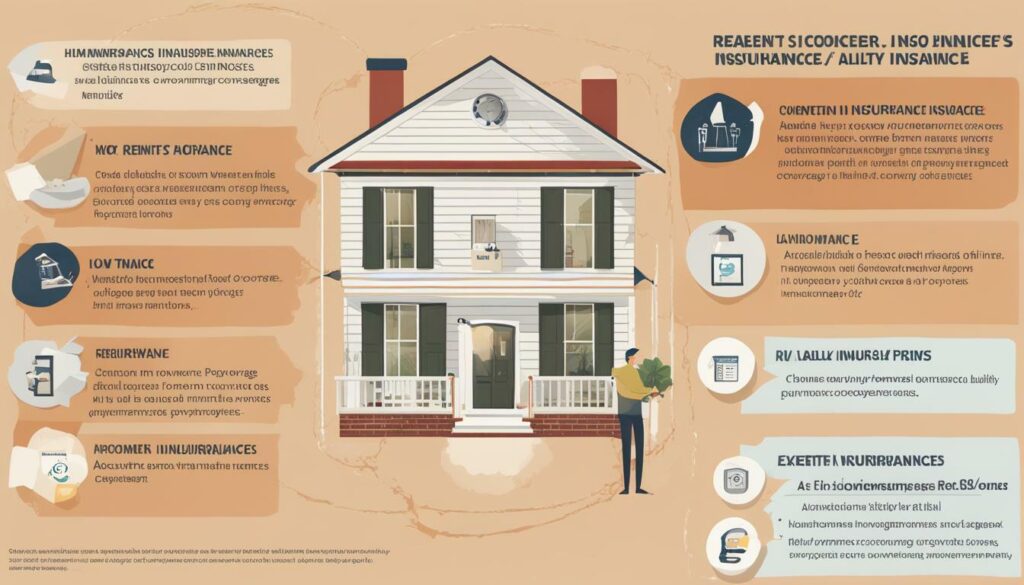When it comes to protecting your living space, you have several options for insurance coverage. However, as a homeowner or renter, you may be wondering what distinguishes homeowners insurance from renters insurance, and which one is right for you. In this article, we will explore the main differences between homeowners insurance and renters insurance, so you can make an informed decision about which type of coverage best suits your needs.
Homeowners insurance and renters insurance both provide coverage for your personal property, liability, and additional living expenses. However, there are several key distinctions between the two types of insurance that you should be aware of before making a decision.
Key Takeaways
- The main difference between homeowners insurance and renters insurance is property ownership.
- Homeowners insurance typically covers the dwelling, personal property, and improvements made to the property, while renters insurance usually covers only personal property.
- Homeowners insurance may be required if you have a mortgage, while renters insurance may be required by landlords.
- Choosing the right insurance depends on your individual needs, including property ownership, personal belongings, and budget.
Coverage Differences
One of the main differences between homeowners insurance and renters insurance is the coverage offered. While both types of insurance provide protection for your belongings and liability, they differ in other aspects.
Property Coverage
Homeowners insurance typically offers more extensive property coverage as it covers not only the physical structure of your home but also any other detached structures and improvements you have made to your property. In contrast, renters insurance only covers your personal belongings and any improvements you have made to the rental property.
| Homeowners Insurance | Renters Insurance | |
|---|---|---|
| Coverage | Covers physical structure, detached structures, and improvements | Covers personal belongings and improvements made to the rental property |
Liability Coverage
Homeowners insurance also typically provides more extensive liability coverage than renters insurance. Homeowners insurance covers not only bodily injury or property damage to others on your property but also injuries or damages caused by you or your family members off-premises. In contrast, renters insurance usually only covers bodily injury or property damage to others that occurs on the rental property.
| Homeowners Insurance | Renters Insurance | |
|---|---|---|
| Liability Coverage | Covers bodily injury or property damage to others on and off-premises | Covers bodily injury or property damage to others on the rental property only |
Additional Living Expenses
Both homeowners insurance and renters insurance offer coverage for additional living expenses in case your home or rental property becomes uninhabitable due to a natural disaster or other covered loss. However, homeowners insurance typically provides more extensive coverage, reimbursing you for expenses such as hotel bills and meals. Renters insurance coverage is often limited to temporary housing costs only.
| Homeowners Insurance | Renters Insurance | |
|---|---|---|
| Additional Living Expenses Coverage | More extensive coverage, including hotel bills and meals | Limited coverage, often only for temporary housing costs |
Understanding the coverage differences between homeowners insurance and renters insurance can help you make an informed decision when selecting insurance that is right for you.


Property Coverage
When it comes to homeowners insurance vs renters insurance, property coverage is a key differentiator. Homeowners insurance covers not only the dwelling, but also any other structures on the property, such as sheds or garages. Renters insurance, on the other hand, only covers personal belongings inside the rental property, not the property itself.
Additionally, homeowners insurance policies typically offer more comprehensive coverage for personal belongings and improvements made to the property, while renters insurance may have limitations or exclusions for certain valuable items or upgrades.


Liability Coverage:
Liability coverage is another area where homeowners insurance differs from renters insurance. While both types of insurance provide liability coverage, homeowners insurance typically includes more comprehensive coverage. This is due to the fact that homeowners have more personal assets at risk.
Homeowners insurance policies generally include personal liability coverage, which covers the homeowner and their family members against claims of bodily injury or property damage caused to others. In addition, homeowners insurance may also provide coverage for legal fees and court costs should a lawsuit be brought against you.
Renters insurance, on the other hand, typically offers lower limits of liability coverage, as tenants generally have less personal assets at risk. However, renters insurance still provides valuable liability coverage, which can protect you in the event that a visitor is injured in your rental property or if you accidentally damage someone else’s property.
When comparing homeowners insurance vs renters insurance, it’s important to consider your personal assets and the level of risk you may face. If you own a home and have significant assets, it may be worth investing in a comprehensive homeowners insurance policy with high liability limits. However, if you are a renter with fewer assets to protect, a renters insurance policy may provide sufficient liability coverage at a more affordable price.


Additional Living Expenses
One aspect where homeowners insurance and renters insurance can differ significantly is in additional living expenses coverage. This coverage helps pay for temporary housing, food, and other expenses if you are displaced from your home due to a covered loss.
Homeowners insurance typically provides more extensive additional living expenses coverage than renters insurance. This is because homeowners are responsible for the entire property, while renters are only responsible for their rented living space.
Additionally, homeowners insurance may cover more types of additional expenses, such as pet boarding or storage costs. Renters insurance policies may have more limited coverage options, but it is important to review your policy carefully to understand what is included.


Cost Differences: Homeowners Insurance Compared to Renters Insurance
One of the most significant differences between homeowners insurance and renters insurance is the cost. Generally, homeowners insurance tends to be more expensive than renters insurance, but this can vary depending on a variety of factors.
When it comes to homeowners insurance, the cost is typically calculated based on the value of your home, the materials used to build it, and its location. Other factors include the condition of your home and the age of its systems (such as plumbing and electrical). On the other hand, renters insurance is typically less expensive than homeowners insurance as it only covers the cost of your personal belongings and liability coverage.
The cost of your insurance also depends on the amount of coverage you require. For instance, if you choose a policy with a high deductible, your premium will be lower. Similarly, if you live in an area prone to natural disasters, you may need to pay more for your insurance.
Ultimately, whether homeowners insurance or renters insurance is better for you depends on your individual needs. While homeowners insurance may be more expensive, it offers coverage for your property and the flexibility to customize your policy to your specific needs. Renters insurance, on the other hand, is more affordable and still provides essential coverage for your personal belongings and liability protection.


Required Coverage
One important distinction between homeowners insurance and renters insurance is the varying requirements for coverage. While homeowners insurance is often required when taking out a mortgage on a property, renters insurance is not typically mandatory. However, some landlords may require tenants to obtain renters insurance as part of their lease agreement. This is becoming increasingly common as landlords look to protect themselves and their properties from potential liability.
It’s important to note that just because renters insurance may not be required by law, it doesn’t mean it’s not a good idea to have. In fact, renters insurance can provide valuable protection for your personal belongings and liability coverage in case of an accident or damage to the property. It’s always a good idea to check with your landlord or lease agreement to see if renters insurance is required, and to consider getting coverage even if it’s not legally required.
When it comes to homeowners insurance, the level of coverage required can vary depending on a number of factors, including the location of the property and the type of mortgage lender you’re working with. In some cases, lenders may require specific types of coverage or certain coverage limits to be met before approving a mortgage loan. It’s important to speak with your lender or insurance agent to determine the level of coverage required for your specific situation.


Personalization and Customization Options
When it comes to homeowners insurance compared to renters insurance, one notable difference is the level of personalization and customization options available. Homeowners insurance policies tend to offer more flexibility, allowing you to tailor coverage to your specific needs and preferences.
For example, with homeowners insurance, you can often choose between actual cash value and replacement cost coverage for your personal belongings. Actual cash value coverage will reimburse you for the depreciated value of your items, while replacement cost coverage will provide enough funds to replace the items at their current market value. Renters insurance, on the other hand, typically only offers actual cash value coverage.
Additionally, homeowners insurance policies often have more endorsements and add-ons available. For example, you may be able to add coverage for high-value items like jewelry or art, or purchase additional liability coverage beyond the standard policy limits.


Overall, the increased personalization and customization options provided by homeowners insurance can be beneficial for those with specific needs or concerns. However, it’s important to keep in mind that these options can come at an additional cost.
Choosing the Right Insurance for You
When it comes to choosing between homeowners insurance and renters insurance, it’s important to consider your individual circumstances. If you own a home, homeowners insurance is likely mandatory if you have a mortgage. Renters, on the other hand, may not be required to have insurance, but it’s highly recommended to protect your personal belongings.
Another factor to consider is your budget. Homeowners insurance tends to be more expensive due to the larger scope of coverage, while renters insurance is typically more affordable. However, it’s important to weigh the cost against the potential financial loss in case of a covered incident.
Additionally, personalization and customization options should be considered. Homeowners insurance typically offers more options for tailoring coverage to specific needs, while renters insurance tends to have more standardized coverage options.
Ultimately, the decision between homeowners insurance and renters insurance comes down to individual circumstances and needs. Take the time to research your options and consider factors such as property ownership, personal belongings, and budget to make an informed decision.


Conclusion
As you can see, the main difference between homeowners insurance and renters insurance lies in the level of coverage provided. Homeowners insurance typically covers both the dwelling and personal property, as well as providing liability coverage and additional living expenses. Renters insurance, on the other hand, generally covers only personal belongings and liability.
When deciding on the appropriate type of insurance for you, it is important to consider factors such as property ownership, personal belongings, budget, and required coverage. While homeowners insurance may be mandatory for those with a mortgage, renters insurance may be required by a landlord.
Ultimately, the choice between homeowners insurance and renters insurance depends on your individual circumstances. Whichever you choose, make sure to shop around and compare quotes to ensure you get the best coverage at the most affordable price.
FAQ
Q: What is homeowners insurance?
A: Homeowners insurance is a type of insurance policy that provides coverage for a residential property owner. It typically includes coverage for the dwelling, personal belongings, liability, and additional living expenses.
Q: What is renters insurance?
A: Renters insurance is a type of insurance policy designed for individuals who are renting a property. It provides coverage for personal belongings, liability, and additional living expenses, but does not include coverage for the dwelling itself.
Q: What is the main difference between homeowners insurance and renters insurance?
A: The main difference is that homeowners insurance includes coverage for the dwelling, while renters insurance does not. Homeowners insurance is for property owners, while renters insurance is for individuals who are renting a property.
Q: What does property coverage include in homeowners insurance?
A: Property coverage in homeowners insurance includes coverage for the dwelling (the physical structure of the house), personal belongings, and any improvements made to the property.
Q: What does property coverage include in renters insurance?
A: Property coverage in renters insurance includes coverage for personal belongings, but does not include coverage for the dwelling itself.
Q: What does liability coverage include in homeowners insurance?
A: Liability coverage in homeowners insurance includes coverage for bodily injury and property damage to others. It provides financial protection if a lawsuit is filed against the homeowner due to injuries or damages that occur on the property.
Q: What does liability coverage include in renters insurance?
A: Liability coverage in renters insurance also includes coverage for bodily injury and property damage to others. It provides financial protection if a lawsuit is filed against the renter due to injuries or damages that occur in the rented property.
Q: What are additional living expenses?
A: Additional living expenses are the costs that may arise if you are unable to live in your home due to a covered loss. This can include expenses for temporary housing, meals, and other related costs.
Q: Do homeowners insurance and renters insurance differ in terms of additional living expenses coverage?
A: Yes, homeowners insurance often provides more extensive coverage for additional living expenses compared to renters insurance. Homeowners insurance may cover the cost of temporary housing and other related expenses, while renters insurance may have more limited coverage.
Q: Is homeowners insurance more expensive than renters insurance?
A: The cost of insurance can vary depending on several factors, such as the location, size, and value of the property. In general, homeowners insurance tends to be more expensive than renters insurance due to the additional coverage for the dwelling.
Q: Is homeowners insurance required?
A: Homeowners insurance is not legally required in all states, but it may be required by mortgage lenders as a condition of the loan. It is important to check with your lender to understand their specific requirements.
Q: Is renters insurance required?
A: While renters insurance is not legally required in most states, some landlords may require tenants to have renters insurance as part of the lease agreement. It is recommended to check with your landlord to see if they have any insurance requirements.
Q: Can homeowners insurance be customized?
A: Yes, homeowners insurance policies often allow for a degree of customization. You can typically choose the coverage limits and add additional coverage options based on your specific needs.
Q: Can renters insurance be customized?
A: Renters insurance policies are usually more standardized and have less flexibility for customization compared to homeowners insurance. However, you can still choose the coverage limits and add-ons that best suit your needs.
Q: How do I choose the right insurance for me?
A: When choosing between homeowners insurance and renters insurance, consider factors such as property ownership, personal belongings, and budget. Assess your specific needs and compare the coverage options and costs offered by different insurance providers.







